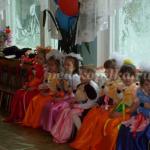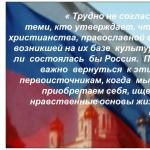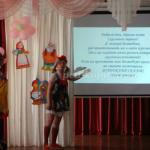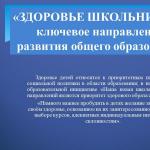"Fundamentals of Spiritual and Moral Education of Preschoolers" was performed by the teacher Zarnitsyna Galina Gennadievna of the Municipal Preschool Educational Institution. Presentation "spiritual and moral education of preschoolers" presentation on the topic Spiritual morality
"FOUNDATIONS OF SPIRITUAL AND MORAL EDUCATION OF PRESCHOOL CHILDREN" Performed by teacher Zarnitsyna Galina Gennadievna Municipal preschool educational institution kindergarten 6 "Yolochka", Vetluga, 2013
True “It is hard to disagree with those who argue that without Christianity, the Orthodox faith, without the culture that arose on their basis, Russia would hardly have taken place. Therefore, it is important to return to these primary sources when we are re-acquiring ourselves, looking for the moral foundations of life” V. Putin


Tasks: Introduce children to the circle of the main Orthodox holidays and the spiritual and moral way of life. To introduce children to the moral foundations of Orthodox culture based on the study of examples from the life of saints and specific historical figures. To instill in children a sense of love and respect for the Motherland, their people, culture. To promote the formation of a respectful, attentive, merciful attitude towards neighbors, respect and love for parents and other people. To assist the family in shaping the personality of the child on the basis of familiarization with the traditions of Orthodox spiritual culture. To help in the development of social skills and skills of arbitrary behavior, attentiveness, patience, diligence, diligence.

Results of the parents' survey Some of the questions in the survey: 1. How often do you visit an Orthodox church? 2. Would you like your child to know the basics of Orthodox culture? 3. Would you like to know how to properly raise a child in a Christian way? 4. Would you like the kindergarten to hold joint events with the clergy?





2. Spiritual and moral education of preschool children Cultural and cognitive (meetings, targeted walks, excursions, watching videos, listening to audio cassettes). Moral and labor (self-service work, work on interests, productive activity, making gifts for the holidays).




Forms of work with parents Lecture hall on spiritual and moral topics with the participation of the clergyman and Orthodox teacher Bushuyeva G.V. "Duties of Christian parents", "On the baptism of children", "On prayer for children", "The role of the father in the family", etc. Information Orthodox corners for parents


Expected results Education of a comprehensively and harmoniously developed personality; Formation of a team where everyone is valuable in itself, and everyone is in harmony with each other; Formation of moral values and traditions of the family; Expanding the scope of knowledge and horizons in the field of spiritual culture.


slide 1
Spiritual and moral education of preschool children in the Ozhoginsky cultural and educational center

slide 2
Since 2010, the Ozhoginsky cultural and educational center has been carrying out spiritual and moral education of preschoolers, which is clearly expressed by the following theses:
1. Language. Language contains in itself in a mysterious and concentrated way the whole soul, the whole past, the whole spiritual structure and all the creative ideas of the people. All this the child must receive along with mother's milk (literally). It is especially important that the awakening of the child's self-consciousness and personal memory take place in his native language. In the future, the cult of the native language should reign in the family and the children's team. In the Ozhoginsky KOC, this principle is implemented through systematic classes with preschoolers on teaching literacy and culture of speech.

slide 4
2. Song. The child should hear the Russian song in the cradle. Singing will bring him the first spiritual breath and the first spiritual groan; they must be Russian. Russian song is deep, like human suffering; sincere as a prayer; sweet as love and consolation; in our dark days, as under the yoke of the Tatars, it will give the child's soul a way out of threatening bitterness and stoneness. It is necessary to start a Russian songbook and constantly enrich the child's soul with Russian melodies - by playing, singing, forcing them to sing along and sing in chorus. Preschool children are happy to reproduce the melodies and words of lullabies, carols, Russian folk songs familiar from infancy. All this is fixed in music lessons, during rehearsals and various holidays and concerts.

Slide 8
Z. Prayer. Prayer is a concentrated and passionate turning of the soul to God. Each nation makes this conversion in its own way, even within a single confession. Prayer will give him spiritual harmony; let him survive it in Russian. A positive example of parents and teachers helps children to become truly spiritual and moral people, who talk with kids on religious topics, make joint excursions and pilgrimages to the Shrines of their large and small Motherland. So gradually children learn to observe the most important Christian commandments.

slide 12
4. Fairy tale. The fairy tale awakens and captivates the dream. It gives the child the first sense of the heroic—a sense of trial, danger, recognition, effort, and victory; she teaches him courage and fidelity; she teaches him to contemplate human destiny, the complexity of the world, the difference between truth and falsehood. The spiritual and moral education of preschoolers is incomplete without a Russian folk tale. Acquaintance with the Russian folk tale at the earliest stage of childhood begins in the family. Later, the fairy tale helps the child to adapt in the children's team, to prepare for school, for adulthood. In the Ozhoginsky KOC, preschoolers actively participate in dramatizations of Russian folk tales. Children listen to new fairy tales with pleasure, together with the teacher they make a puppet theater, learn to get used to the role, to be bolder and kinder.

Slide 18
5. Lives of saints and heroes. The sooner and the deeper the child's imagination is captivated by living images of national holiness and national prowess, the better for him. This component of the spiritual and moral education of preschoolers is implemented in the Ozhoginsky KOC by demonstrating multimedia information, conversations, literary and art exhibitions, and various competitions on the topic: “Lives of Saints and Heroes”.

Slide 19

slide 23
6. Poetry. The Russian people have a one-of-a-kind poetry, where wisdom is clothed in beautiful images, and images become sounding music. The Russian poet is both a national prophet and a national musician. And a Russian person who has fallen in love with Russian verse since childhood never denationalises. To the extent of growth and to the extent possible, it is necessary to give the child access to all types of national art - from architecture to painting and ornamentation, from dance to theater, from music to sculpture. Preschoolers of the Ozhoginsky KOC actively get acquainted with the work of Russian classical poets. A special place in the education of the child's personality is occupied by the poetry of A.S. Pushkin, Under the guidance of teachers, children participate in competitions of readers of Russian poetry, they themselves try to compose their first quatrains. Thus, preschoolers take their first steps in the field of rhetoric, receive a lot of positive emotions from grateful listeners of their speeches.

Slide 29
7. History. The Russian child must feel and understand from the very beginning that he is a Slav, the son of a great Slavic tribe and at the same time the son of the great Russian people, which has a majestic and tragic history behind it, who endured great suffering and ruin and came out of them more than once to rise and flourish. It is necessary to awaken in the child the confidence that the history of the Russian people is a living treasury, a source of living teaching of wisdom and strength. This direction in the education of preschoolers is carried out in the process of thematic excursions to the school corner of local history, the exhibits of which are constantly replenished thanks to parents, teachers, and active residents of the Ozhoginsky KOC. Together with the teacher, preschoolers visit the village memorial of Military Glory, historical memorial places.

Slide 33

slide 36
8. Army. The army is the concentrated strength of my state, the stronghold of my homeland, the embodiment of the courage of my people, the organization of honor, selflessness and service - this is the feeling that should be conveyed to the child. Deepest of all, a preschooler learns the concept of "Army" in the process of role-playing games, sporting events, competitions, conversations with teachers, meetings with military personnel and veterans. The main task of this direction, which is being implemented in the Ozhoginsky KOC when working with preschoolers, is the formation in children of a respectful attitude towards the Russian army, the defenders of the Motherland, pride in the Military Glory of their fathers and grandfathers.

Slide 40

Slide 41
9. Territory. A child - a preschooler should see with his imagination the spatial expanse of his country, this is the national-state heritage of Russia. He must understand that the people do not live for the earth and not for the sake of the earth, but that they live on the earth and from the earth, and that the territory is as necessary to them as the air and the sun. Preschoolers get acquainted with the term "Territory" in the classroom to familiarize themselves with the outside world, through the demonstration of various layouts, maps, posters, multimedia projects. Children with interest compare the territorial space of their state with other countries. They master elementary skills in determining the natural landscape of the area (mountains, plains, rivers, seas).

Slide 44
10. Household. From early childhood, a child should feel the creative joy and power of labor, its necessity, its honor, its meaning. He must experience inwardly that labor is not a disease and that work is not slavery, that, on the contrary, labor is a source of health and freedom. Rural preschoolers mainly get acquainted with the concept of "economy" in the process of observation and participation in domestic and social work together with parents and teachers. Children are happy to visit private livestock farms, gardens and flower gardens of local residents, try to grow their first crop themselves and participate in planting greenery in their group's premises (GKP) and the territory of the KOC. The main task of this direction is the education of diligence, a sense of collectivism and responsibility for the result of one's work.

To use the preview of presentations, create a Google account (account) and sign in: https://accounts.google.com
Slides captions:
MKDOU Novovoronezh kindergarten No. 8 SPIRITUAL AND MORAL EDUCATION OF A PRESCHOOL CHILD Competition "Star of Bethlehem"
Childhood is a time for the development of all human forces, both mental and bodily, the acquisition of knowledge about the world around us, the formation of moral skills and habits. At preschool age, there is an active accumulation of moral experience and an appeal to spiritual life.
The goals of the spiritual and moral education of a preschooler: To lay the foundations of a spiritual and moral personality with an active life position, the ability for perfection and harmonious interaction with other people. To educate in children mercy, compassion, the ability to forgive insults, the desire to help those in need, to be tolerant, peaceful in relationships with everyone. To teach to be an example for others not in words, but in deeds, to avoid evil, envy - to be content with what you have, to be able to ask for forgiveness, to act honestly, never to do to others what you do not want for yourself. Contribute to the preservation of purity, chastity Open the way to spiritual improvement and knowledge of national culture
OBJECTIVES OF EDUCATION: To bring up patriotic feelings that bind different generations. Teach ethical behavior and self-discipline. Improve artistic taste, develop the creative potential of each child. To form artistic and speech skills, replenish the vocabulary of children. To educate spiritual and moral feelings, revealing the meaning of Orthodoxy in a person's life, as an action of love, kindness, humanity, unity. Focus the family on the spiritual and moral education of children.
A characteristic feature of the work on the formation of a spiritual and moral attitude to the cultural heritage and a sense of belonging to it is the familiarization of children with peasant culture and life. Peasant art enters the life of a modern child along with a folk song, a fairy tale, an epic, which is why it is so close to him and understandable. The teachers of our preschool educational institution, together with their parents, children's theaters, help children get an idea of \u200b\u200bdifferent types of folk art and experience the attitude towards them in productive, playful activities.
Acquaintance of a child with folk art develops his taste and respect for material values created by previous generations.
Optimal for spiritual and moral education in kindergarten is the holding of holidays
Remember! We are proud!
Matryoshka exhibition Teachers involve children and parents in the process of making folk toys, costumes and other items. This is very important, as it allows us to show the continuous connection of generations and the connection of art with spiritual traditions. Easter Kaleidoscope
We introduce children to folk costumes. We always turn to the game. Folk games are an integral part of the spiritual and moral education of preschoolers.
Action "Children of Russia for Peace" Drawing - the winner of the All-Russian competition "My Family"
Cooperation with the school
The spiritual and moral education of preschoolers is a kind of core around which it is advisable to build the entire process of their upbringing and education. The preschool teacher establishes a spiritual connection with the child every day. “The educator who does not fetter, but liberates, does not break, but forms, does not suppress, but elevates, does not dictate, but teaches, does not demand, but asks, experiences many inspired minutes with the child.” J. Korczak
Social interaction
Guests are always welcome! See you soon!
Expected results - a graduate child: Knows and respects the main socio-forming domestic folk traditions, loves the Motherland, native land, home, neighbors, respects elders; Respects the work of other people, consciously fulfills his duties; Keeps the millennial traditions of the defenders of our Motherland, feels responsible for the lives of his loved ones and his Fatherland; Considers his own and other people's behavior from a traditional Christian moral point of view for Russia; Knows and applies generally accepted norms and rules of conduct; Shows a benevolent attitude towards people around, wildlife, culture, literature, art; Possesses age-appropriate communication skills and abilities; Perceives the beauty of the native language, seeks to avoid words and expressions that litter the native speech.
On the topic: methodological developments, presentations and notes
Moral education of preschool children. Conversations on the education of a culture of behavior of preschoolers.
Practical material on the education of a culture of behavior of preschoolers. Presented in the form of conversations that can be conducted with older preschool children....
Russian nature... These words easily bring to mind a variety of familiar and expensive paintings. Slender pine forests and light birch groves. Green meadows full of freshness and golden bread...
Patriotic education of preschool children based on the implementation of the author's program "Hope of Russia" Social and moral education and development of preschool children: state, problems, prospects. Kirov, 2007
The article is devoted to the issues of introducing preschool children to folk culture....
Innovative activity in ecological education of preschool children. Consultation for educators (As part of the project “I want to know everything!” The use of modern pedagogical technologies in the environmental education of preschoolers)
Today, more than ever, the environmental problem has become one of the most pressing problems of modern society. Mankind will be able to save the environment, provided that everyone realizes the responsibility for...
NOD "Round dance of friendship" Relevance: The problem of patriotic education of the younger generation is one of the most urgent today. The patriotic education of preschool children is not only the education of love for one's home, family, kindergarten, city, native
Relevance: The problem of patriotic education of the younger generation is one of the most urgent today. Patriotic education of preschoolers is not only the education of love for one's home, se...
A brief report on the progress of work on the spiritual, moral and patriotic education of preschoolers in the framework of self-education
To use the preview of presentations, create a Google account (account) and sign in: https://accounts.google.com
Slides captions:
Spiritual and moral education of preschool children
Education should educate a person and a citizen. A person is a healthy soul in a healthy body. Citizen - morality, education, art, independence. V. A. Zhukovsky
Relevance Society needs to educate not only educated people, but also educated people. In the modern world, the child is surrounded by many strong sources of positive and negative influence on his intellect and feelings. It is important for a child to know the principles of morality and the consequences of violating these principles for the people around them.
At preschool age, there is an active accumulation of moral experience and an appeal to spiritual life. Spirituality is a manifestation of the spirit in the world and man, uniting the beginning of society, expressed in the form of moral values and traditions, concentrated in religious teachings and practices, ... images of art. Morality is the internal attitude of a person to act according to his conscience. (Explanatory dictionary of the Russian language)
Morality - a set of norms and rules governing the relations of people in society on the basis of public opinion, stimulating or inhibiting their behavior and activities; a state of mutual sympathy with the whole world, but above all with the whole people
Spirituality is the moral and aesthetic state of a person, expressed in the commitment to such values as freedom, humanism, social justice, truth, goodness, beauty, in an endless internal dialogue aimed at understanding the secret of one's purpose and the meaning of life. Academician B. T. Likhachev
Purpose: the formation of a moral personality, the promotion of spiritual experience, familiarization with the values of culture
Cognitive tasks: to instill children's interest in the history of their country, their people, to awaken a sense of belonging to it; to promote the formation of feelings of love for the Motherland based on the study of national cultural traditions; to introduce children to the symbols of Russia, the Chelyabinsk region, district, city; develop children's ideas about family traditions; continuity that links different generations.
Developing tasks: to promote the development of: intellectual abilities; thinking; speech; imagination; emotional-volitional sphere
Educational: to cultivate love and respect for the Motherland: its people, history, culture, shrines, traditions of the people; to cultivate respect for moral standards; to teach to distinguish between good and evil, good and bad deeds, to forgive insults, to be responsive, attentive to peers and elders; create conditions for the child to show a caring attitude towards others, the ability to empathize, joyfulness
The system of spiritual and moral education is based on the familiarization of preschoolers with the historical and cultural heritage of their people and is carried out in the following directions
Spiritual traditions of folk culture
Principles: purposefulness of the pedagogical process; scientific nature of the content of education and training; systematic, consistent; accessibility, taking into account the age and individual characteristics of children; an integrated approach to education and upbringing, the choice of optimal methods, forms, means of education and upbringing, cooperation between an adult and a child; teachers and parents
The spiritual life of a child is full only when he lives in the world of play, fairy tales, music, fantasy, creativity. Without it, he is a dried flower. V. Sukhomlinsky
Activities cognitive activity: reading historical and fiction literature, fairy tales; visiting the local history museum; educational conversations; work with the folk calendar, excursions, targeted walks along the streets of the city;
creative productive activity: making applications, figurines, designs, crafts, drawings;
theatrical activities: simulated scenes and performances pre-holiday gatherings;
game activity: games that teach the ability to communicate, establish contact, enjoy communication with a partner; foster love and respect for loved ones and others; help the child in the accumulation of social experience;
creative activity: modeling from plasticine, painting and graphics, musical creativity, dancing;
moral activity: lessons of love and kindness, acquaintance with Orthodox traditions and values;
conducting classes in the mini-museum of the kindergarten;
joint activities of children and parents aimed at strengthening family values, respect and mutual understanding: family and Orthodox holidays, games and competitions;
Conditions: Subject-developing environment Didactic means: traditions, rituals of folk holidays and everyday life of Russians; folklore; folk toys; Houseware; objects of arts and crafts; collections: clothes, coins, postcards, household items; popular science and fiction; Photo; reproductions, illustrations; schemes, models, symbols (heraldry); video, audio production.
Social: Museums; Showroom; Libraries; Surrounding nature
Spiritual and moral education allows preschoolers to form: worldview; civil position; family values; moral guidelines
Spiritual and moral education, the affirmation of the ideals of kindness, mercy and justice, are the most important mission not only of a religious organization, but of society as a whole. Such values have at all times held our Fatherland together, shaped national traditions and moral principles. Today they allow Russia to preserve its historical roots and cultural and spiritual independence.
Let the child feel the beauty and admire it, let the images in which the MOTHERLAND is embodied be forever preserved in his heart and memory. V. Sukhomlinsky
On the topic: methodological developments, presentations and notes
Moral education of preschool children. Conversations on the education of a culture of behavior of preschoolers.
Practical material on the education of a culture of behavior of preschoolers. Presented in the form of conversations that can be conducted with older preschool children....
Russian nature... These words easily bring to mind a variety of familiar and expensive paintings. Slender pine forests and light birch groves. Green meadows full of freshness and golden bread...
Labor education begins at preschool age, when the child first feels the need for independent activity, declaring his intentions and showing himself to be the subject of his desires and ...
Theme "Spiritual and moral education of preschool children" Folk culture in the system of spiritual and moral education.
1. Relevance of the problem. In the modern world, material values dominate over spiritual ones, so children's ideas about kindness, mercy, generosity, justice, citizenship and patriotism are distorted. Therefore, one should not underestimate the importance of spiritual and moral education for the versatile development of the individual. In modern socio-economic conditions, the priority areas in the work of preschool institutions are the versatile development of each child, the disclosure of his creative potential. The content of education today is focused not only on the enrichment of key competencies, but also on the upbringing of the child's personality, which is understood as the process of becoming the spiritual image of the "I" of the child, where, first of all, conditions are created for the development of the value-semantic sphere of the child's consciousness, his abilities, the ability to live in harmony with yourself and the world around you.

Folk culture in the system of spiritual and moral education. Traditions are the most valuable thing in the culture of every nation. It is very important that children from the earliest years know what the Fatherland, Motherland, native land are. Therefore, starting from preschool age, children should be told about the people of their native land, about the natural basis of our existence, about the place where a person was born and lives, about those traditions that are revered. The child needs help in understanding the diversity of connections that exist between us and our ancestors. Only then the traditions of the past, moral values will acquire special significance for the child, becoming important and relevant today. “We must not forget about our cultural past, about our monuments, literature, language, art… National differences will remain in the 21st century if we are concerned with the education of souls, and not just the transfer of knowledge,” Academician D. Likhachev.

The museum has something that is above all competition - true values. The idea of creating a museum came to the teaching staff of our institution a long time ago, back in 2000. For several years, in an experimental mode, we have been developing the problem of "Introducing preschool children to the origins of traditional Russian culture." The entire staff of the kindergarten worked in this direction. Parents and residents of Sadovoe and Akhmat villages. Acquaintance of children with museum exhibits can have a huge impact on their general and cultural development, especially if the museum is created by the hands of the children themselves, parents and other relatives, teachers. At the same time, the choice of the profile of the museum is of fundamental importance: it is important to understand what content of the museum exposition will provide the pedagogical impact required to improve the quality of upbringing and education of children.

Museum of Russian life "Gornitsa" During this time, a lot of methodological and creative developments have accumulated, and a large collection of Russian folk crafts and household items has been collected. Initially, individual items were presented in a small volume in the playroom of the older group of the kindergarten. But gradually the collection increased, moreover, very interesting exhibits appeared that required a special arrangement. Therefore, it was decided to systematize all the material and collect it in a separate room - a museum. So the room-museum of Russian life "Gornitsa" appeared.






Excursions and classes in the room-museum "Gornitsa" Classes in museum pedagogy with older preschoolers are held in the museum. Classes are conducted by a guide. Children of senior and preparatory groups not only get acquainted with the profession of a "guide", but over time they themselves actively participate in the creation of expositions and begin to conduct excursions for their friends, children of younger groups, parents and guests of the kindergarten.



Collection of Russian shawls The exhibition of scarves and Russian shawls is constantly updated and replenished with new exhibits. They are carried by the grandmothers and great-grandmothers of our pupils, knowing that they will be admired in our museum. Children also get acquainted with the art of the Pavlovsk masters.


Lace collection Lace collars, napkins, lace tablecloths - all these exhibits are authentic, made by craftswomen of the early 20th century, almost none of them are alive, and children, their parents, villagers and even guests from other cities admire their needlework.







